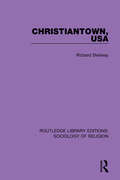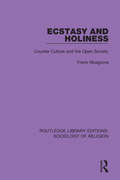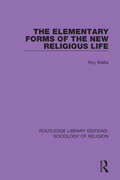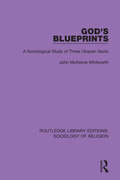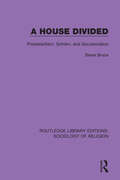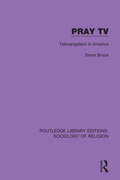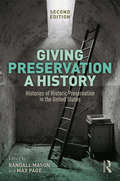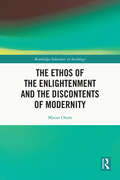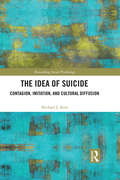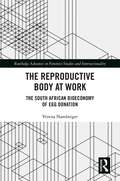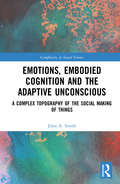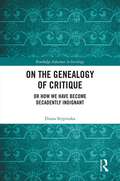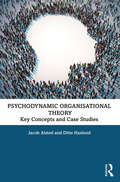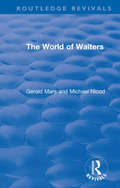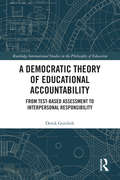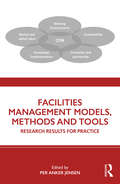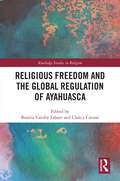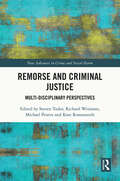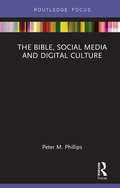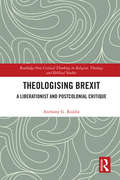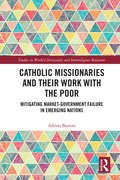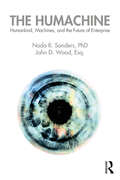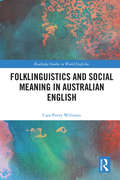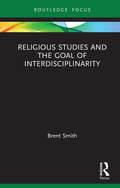- Table View
- List View
Homelessness: The (In)Appropriate Applicant (Routledge Revivals)
by David CowanFirst published in 1997, this volume presents the results of in-depth research into the application of the UK homelessness legislation in relation to community care, the Children Act 1989, violence to women, and racial harassment. This is supplemented with a consideration of policies and practices in 15 local authority homelessness departments. It is argued that government created the nation of a successful, or "appropriate" applicant, but this could not be translated into actual practice as the original legislation did not facilitate it. In fact, in the mid-1990s, government became more concerned with notions of inappropriateness, stereotyping those using the homelessness legislation and creating modern "folk devils". This was the background to the 1996 changes to the homelessness legislation which have created the notion of the "inappropriate" applicant. It is argued that the new legislation is more concerned with denial, deterrence and privatization. The new legislation has also detrimentally affected the application of the homelessness legislation in each of the areas discussed.
Christiantown, USA (Routledge Library Editions: Sociology of Religion #1)
by Richard StellwayAre Christian families more - or less - strong than other families? How important is sexual satisfaction to marital happiness? What impact does the arrival of children have on a marriage? How does income affect marital satisfaction? What pressures confront employed wives and their families and how content are these women with their marriages?To accurately assess the influence of religion on the marriages of churchgoers, this book, first published in 1990, considers the significance of other important forces as well - level of education, job satisfaction, income, sex life, patterns of decision making, coping strategies, and the demands of parenting. While most studies have been content to assess religion's impact by looking at church membership or church attendance, this book looks at several facets of religiosity in an effort to understand more clearly just how and when religion affects marriage quality and whether its impact is positive or negative.A final concern of the book is to assess how the current generation of couples is adapting to intergenerational changes such as increased occupational status, more egalitarian patterns of decision-making, and smaller families. It examines the role modifications and coping strategies that couples are employing to deal with these changes and with the demands that accompany them.
Ecstasy and Holiness: Counter Culture and the Open Society (Routledge Library Editions: Sociology of Religion #2)
by Frank MusgroveThis book, first published in 1974, argues that the counter culture is not the outcome of alienation, but of opportunity, being the result of a new generational consciousness, an openness which has characterised industrial societies of the West since the 1950s. Its roots lie in economic expansion and population movement and growth, the same factors that are cited in the decline of religiousness.
The Elementary Forms of the New Religious Life (Routledge Library Editions: Sociology of Religion #3)
by Roy WallisThis book, first published in 1984, examines the whole range of new religious movements which appeared in the 1960s and 1970s in the West. It develops a wide-ranging theory of these new religions which explains many of their major characteristics. Some of the movements are well-known, such as Scientology, Krishna Consciousness, and the Unification Church. Others such as the Process, Meher Baba, and 3-HO are much less known. While some became international, others remained local; in other ways, too, such as style, belief, organisation, they exhibit enormous diversity. The movements studied here are classified under three ideal types, world-rejecting, world-affirming and world-accommodating, and from here the author develops a theory of the origins, recruitment base, characteristics, and development patterns which they display. The book offers a critical exploration of the theories of the new religions and analyses the highly contentious issue of whether they reflect the process of secularisation, or whether they are a countervailing trend marking the resurgence of religion in the West.
God's Blueprints: A Sociological Study of Three Utopian Sects (Routledge Library Editions: Sociology of Religion #4)
by John McKelvie WhitworthViewing the world with abhorrence, members of utopian sects isolate themselves from its influence. As this book, first published in 1975, shows, they seek to establish and promulgate radically distinctive forms of society according to what they claim to be God’s blueprint and which they believe are destined by his intervention and their example to spread throughout the world. Rooted in the sociology of religion and more particularly in the concepts of sectarianism and communitarianism, this study presents an analysis of three sects: the Shakers; the Oneida Community; and the Bruderhof. The author examines the origins, religious conceptions, social structure and composition, modes of social control, and development of each group; and in a concluding chapter he discusses the utopian sect as a distinctive social form.
A House Divided: Protestantism, Schism and Secularization (Routledge Library Editions: Sociology of Religion #5)
by Steve BruceThe main concern of this study, first published in 1990, is the part played by Protestantism in the complex of social processes of ‘secularization’. The book deals with the way in which Protestant schism and dissent paved the way for the rise of religious pluralism and toleration; and it also looks at the fragility of the two major responses to religious pluralism – the accommodation of liberal Protestantism and the sectarian rejection of the conservative alternative. It examines the part played by social, economic and political changes in undermining the plausibility of religion in western Europe, and puts forward the argument that core Reformation ideas must not be overlooked, particularly the repercussions of different beliefs about authority in competing Christian traditions.
Pray TV: Televangelism in America (Routledge Library Editions: Sociology of Religion #7)
by Steve BruceIn this book, first published in 1990, the significance of televangelism in America is examined in detail. This well-informed, measured analysis includes discussion of the place of televangelism in the history of American Protestantism; the styles of leading TV preachers and the televangelical star system; the relation of televangelism to conservatism and politics. It also answers the questions of televangelism’s organisation and audience, as well as providing an analysis over the wave of scandals which swept over Pray TV in the 1980s.
Giving Preservation a History: Histories of Historic Preservation in the United States
by Randall Mason Max PageIn this volume, some of the leading figures in the field have been brought together to write on the roots of the historic preservation movement in the United States, ranging from New York to Santa Fe, Charleston to Chicago. Giving Preservation a History explores the long history of historic preservation; how preservation movements have taken a leading role in shaping American urban space and development; how historic preservation battles have reflected broader social forces; and what the changing nature of historic preservation means for efforts to preserve national, urban and local heritage. The second edition adds several new essays addressing key developing areas in the field by major new voices. The new essays represent the broadening range of scholarship on historic preservation generated since the publication of the first edition, taking better account of the role of cultural diversity and difference within the field while exploring the connections between preservation and allied concerns such as environmental sustainability, LGBTQ and nonwhite identity, and economic development.
The Ethos of the Enlightenment and the Discontents of Modernity (Routledge Advances in Sociology)
by Matan OramThis book probes the sources and nature of the ‘discontents of modernity’. It proposes a new approach to the philosophic-critical discourse on modernity. The Enlightenment is widely understood to be the foundational moment of modernity. Yet despite its appeal to reason as the ultimate ground of its authority and legitimacy, the Enlightenment has had multiple historical manifestations and, therefore, can hardly be said to be a homogenous phenomenon. The present work seeks to identify a unitive element that allows us to speak of the Enlightenment. To do so, it enjoins the concept of ‘ethos’ and its relation to the ‘discontents of modernity’. This book proposes a new theoretical framework for the examination of the interrelationships between ‘critical thought’ and ‘modernity’, based on a fundamental distinction between criticism and negation. It will appeal to scholars and students of critical theory, the history of ideas, philosophy, the sociology of knowledge, and political science.
The Idea of Suicide: Contagion, Imitation, and Cultural Diffusion (Researching Social Psychology)
by Michael J. KralThis book is about a new theory of suicide as cultural mimesis, or as an idea that is internalized from culture. Written as part of a new, critical focus in suicidology, this volume moves away from the dominant, strictly scientific understanding of suicide as the result of a mental disorder, and towards positioning suicide as an anthropologically salient, community-driven phenomenon. Written by a leading researcher in the field, this volume presents a conception of suicide as culturally scripted, and it demonstrates how suicide becomes a cultural idiom of distress that for some can become a normative option.
The Reproductive Body at Work: The South African Bioeconomy of Egg Donation (Routledge Advances in Feminist Studies and Intersectionality)
by Verena NambergerThe transnational industry surrounding assisted reproductive technology and regenerative medicine is based on the unacknowledged labour of gamete providers, surrogates and research subjects, and benefits from low labour costs in ‘enabling’ sectors such as logistics and transport. This finding calls for a comprehensive analysis of how the contemporary intersection of neoliberal capitalism and the life sciences - in short, the bioeconomy - capitalises on the body and its (re)productive capacities. The Reproductive Body at Work uptakes this challenge as it explores the relations between value production, labour and the body in one particular realm of the global bioeconomy: the South African bioeconomy of ‘egg donation’. It highlights different forms and dimensions of unacknowledged or precarious human labour that are constitutive for the procurement, brokering and circulation of oocytes as valuable resources. The analysis illustrates that the respective organisation of value and labour renegotiate what ‘the’ (re)productive body can do, which status and roles it is ascribed, which cultural and economic values it signifies and how it is experienced and enacted within a matrix of intersectional power relations. A theoretically profound contribution to the interdisciplinary debate on ‘New materialism’, The Reproductive Body at Work will appeal to students and researchers interested in fields such as gender studies, medical anthropology, cultural studies, sociology, political economy and science and technology studies.
Emotions, Embodied Cognition and the Adaptive Unconscious: A Complex Topography of the Social Making of Things (Complexity in Social Science)
by John A. SmithEmotions, Embodied Cognition and the Adaptive Unconscious argues for the need to consider many other factors, drawn from disciplines such as socio-biology, evolutionary psychology, the study of the emotions, the adaptive unconscious, the senses and conscious deliberation in analysing the complex topography of social action and the making of things. These factors are taken as ecological conditions that shape the contemporary expression of complex societies, not as constraints on human plasticity. Without ‘foundations’, complex society cannot exist nor less evolve. This is the familiar pairing from complexity theory: path dependency and dynamic emergence. Inter-disciplinary and complexity perspectives need to be incorporated into the social sciences. Routinely, sociologists think of social phenomena as a distinct field, expressed in the term: the ‘social construction of’ without apparent need to refer to other material, biological, psychological, material or ecological conditions or agents. This book shows how the familiar sociological dynamics of identity, solidarity, differentiation and communication are shaped through the persistent interaction of unconscious and affective processing with conscious deliberation in newly emergent contexts. It is this re-expression, not the surpassing, of human characteristics in contemporary social action that needs to re-inform a complex, ecological approach to the theory and methodologies of the social sciences. The book is intended for a postgraduate/research audience and doctoral students to introduce and synthesise inter-disciplinary contributions to research into complexity theory in the social sciences.
On the Genealogy of Critique: Or How We Have Become Decadently Indignant (Routledge Advances in Sociology)
by Diana StypinskaOn the Genealogy of Critique intervenes into both contemporary academic debates on critique, and today’s mainstream criticism, by reflecting upon the relationship between criticality and social change in the age of post-politics. What does it mean to be critical? When we are told that civilisation is facing extinction, does the idea of critique still hold any value? Today, more than ever, we seem to be critical of everything. Yet, paradoxically, our criticism exerts very little political influence. Taking this problematique as its starting point, this book reclaims the transformative potential of critique, challenging the common assumptions about criticality. It presents a counter-history of criticism, demonstrating how the modern notion of critical subjectivity embodies an imperative to the securitisation of the status quo. In elaborating on a range of contemporary critical (dis)positions, the book advocates new ways of thinking about critique and social change. Through this, it equips the reader with analytical tools useful for thinking the way out of our post-political predicament. This book is of relevance to anyone concerned with social change. Particularly, it will be of use to academics, postgraduates and advanced undergraduate students working in the areas of sociology, politics, philosophy and cultural studies.
Psychodynamic Organisational Theory: Key Concepts and Case Studies
by Jacob Alsted Ditte HaslundOn the surface, people go to work and come home again. They sometimes manage people while most are managed themselves. But beneath the function and structures of the work itself, a whole range of emotions affects the success of the relationship between employee and manager and ultimately the organisation they both belong to. Psychodynamic Organisational Theory: Key Concepts and Cases provides a comprehensive but accessible introduction to this fascinating field of study. Featuring case vignettes which bring the various concepts to life, the book is divided into four parts. Part I looks at how the individual relates to the organisation and the unconscious energies they bring, while Part II examines group dynamics and how they affect productivity, including a chapter on meetings. Part III explores the realm of leadership and what roles a manager can play in managing their staff, while Part IV introduces the idea of personality and describes how the manager’s personality influences management dynamics as well as the wider organisational culture. Central to the book, as well as the idea that organisational phenomena are often unconscious, is the understanding that relationships are always reciprocal. Through complex psychological dynamics manager and employee influence and change each other during the process of managing and being managed. This text will be essential reading for students and scholars of leadership, HRM, and organizational psychology, as well as consultants and managers looking for practical insights into how human relationships affect the success of every organisation.
The World of Waiters (Routledge Revivals)
by Gerald Mars Michael NicodOriginally published in 1984, The World of Waiters provides a close look at the area of everyday working life, focusing on the profession of waiters. The book addresses the complex world of waiters, look at the insecurities, hierarchies and ‘the politics of serving’ that come into play in the everyday working life of a waiter. The book addresses the issues facing waiters in everyday life, including the placing and spacing of customers, the process of ordering and tipping, and customer complaints – all of these are looked at through the lens of the rules adhered to by waiters. The book is created from data compiled by the from 5 English hotels at varying grades. This book provides an interesting case study of the restaurant industry, and will be of interest to any academics working in the field of sociology, in particular the field of the sociology of work and anthropology.
A Democratic Theory of Educational Accountability: From Test-Based Assessment to Interpersonal Responsibility (Routledge International Studies in the Philosophy of Education)
by Derek GottliebThis insightful text offers a detailed account of the historical development of educational accountability in the US public education system. In doing so, it diagnoses the unforeseen consequences arising from a centralized, technocratic implementation of the concept, and calls for a radical re-thinking in how our democratic responsibilities translate into the provision, measurement, and conceptualization of education. Drawing from the works of scholars including Stanley Cavell, Linda Zerilli, Daniel Koretz, and James Scott, A Democratic Theory of Educational Accountability illustrates the way in which "educational accountability" has foregrounded centralized measures of "success" to the point of perversity. Through nuanced political theory and philosophical arguments, the text demonstrates how test-based measures have rendered the holistic aims of education futile, resulting in an education system of "box-checking" and "rule-following". Ultimately calling for a new imagination of how our democratic responsibilities are enacted in schools and communities, Gottlieb illustrates how accountability can be used for good, to ensure that our schools nurture talent, cultivate social mobility, and engage with local needs. This text will be of great interest to graduate and postgraduate students, researchers, academics, and libraries in the field of philosophy of education, educational policy, assessment & testing and democratic theory.
Facilities Management Models, Methods and Tools: Research Results for Practice
by Per JensenThis book presents research tested models, methods and tools that can make the work of the facilities manager more robust and sustainable, help long-term strategic planning and support students and practitioners in FM to improve the way they approach and deal with challenges in practice. The 34 models, methods and tools are presented in relation to five typical challenges for facilities managers: Strategy development Organisational design Space planning Building projects Optimisation The chapters are short and concise, presenting a central illustration of one model, method or tool with explanatory text and short, exemplary case studies. Each chapter includes references to further reading, and the book includes a keyword index. Essential reading for all involved in the management of built assets, this book bridges the gap between robust academic research and practical industry tools. It can also be used as a handy student reference.
Religious Freedom and the Global Regulation of Ayahuasca (Routledge Studies in Religion)
by Beatriz Caiuby Labate Clancy CavnarThis book offers a comprehensive view of the legal, political, and ethical challenges related to the global regulation of ayahuasca, bringing together an international and interdisciplinary group of scholars. Ayahuasca is a psychoactive brew containing DMT, which is a Schedule I substance under the United Nations Convention on Psychotropic Substances, and the legality of its ritual use has been interpreted differently throughout the world. The chapters in this volume reflect on the complex implications of the international expansion of ayahuasca, from health, spirituality, and human rights impacts on individuals, to legal and policy impacts on national governments. While freedom of religion is generally protected, this protection depends on the recognition of a religion’s legitimacy, and whether particular practices may be deemed a threat to public health, safety or morality. Through acomparative analysis of different contexts in North America, South America and Europe in which ayahuasca is consumed, the book investigates the conceptual, philosophical, and legal distinctions among the fields of shamanism, religion, and medicine. It will be particularly relevant to scholars with an interest in Indigenous religion and in religion and law.
Remorse and Criminal Justice: Multi-Disciplinary Perspectives (New Advances in Crime and Social Harm)
by Richard Weisman Michael Proeve Steven Tudor Kate RossmanithThis multidisciplinary collection brings together original contributions to present the best of current thinking about the nature and place of remorse in the context of criminal justice. Despite the wide-spread and long-standing nature of interest in offender remorse, the topic has until recently been peripheral in academic studies. The authors are scholars from North America, the UK, Europe, South Africa and Australia, from diverse academic disciplines. They reflect on the role of remorse in law, for better or for worse, on how expressions of remorse are affected by the legal contexts in which they arise, and on the impact of these expressions on the individual, the court, and the community. The work is divided into four parts – Part I Judging Remorse addresses issues concerning the task of assessing remorse in the courtroom, usually prior to determining sentence. Part II Remorse Beyond the Courtroom explores the place and significance of remorse in various post-court settings. Part III Remorse, War and Social Trauma addresses remorse in the context of political violence and social trauma in the former Yugoslavia and South Africa. Finally, Part IV Reflections seeks to underscore the multidisciplinary and interdisciplinary nature of the collection as a whole, through personal and disciplinary reflections on remorse. The work provides a showcase for how diverse academic disciplines can be brought together through a focus on a common topic. As such, the collection will become a standard reference work for further research across a range of disciplines and promote inter-disciplinary dialogue.
The Bible, Social Media and Digital Culture (Routledge Focus on Religion)
by Peter M. PhillipsThis book centres on the use of the Bible within contemporary digital social media culture and gives an overview of its use online with examples from brand-new research from the CODEC Research Centre at Durham University, UK. It examines the shift from a propositional to a therapeutic approach to faith from a sociological standpoint. The book covers two research projects in particular: the Twitter Gospels and Online Moralistic Therapeutic Deism. It explores the data as they relate to Abby Day’s concept of performative belief, picking up on Mia Lövheim’s challenge to see how this concept works out in digital culture and social media. It also compares the data to various construals of contemporary approaches to faith performative faith, including Christian Smith and Melissa Lundquist Denton’s concept of moralistic therapeutic deism. Other research is also compared to the findings of these projects, including a micro-project on Celebrities and the Bible, to give a wider perspective on these issues in both the UK and the USA. As a sociological exploration of Digital Millennial culture and its relationship to sacred texts, this will be of keen interest to scholars of Biblical studies, religion and digital media, and contemporary lived religion.
Theologising Brexit: A Liberationist and Postcolonial Critique (Routledge New Critical Thinking in Religion, Theology and Biblical Studies)
by Anthony G. ReddieThis book offers a comprehensive analysis of the theological challenge presented by the new post-Brexit epoch. The referendum vote for Britain to leave the European Union has led to a seismic shift in the ways in which parts of the British population view and judge their compatriots. The subsequent rise in the reported number of racially motivated incidents and the climate of vilification and negativity directed at anyone not viewed as ‘authentically’ British should be a matter of concern for all people. The book is comprised of a series of essays that address varying aspects of what it means to be British and the ways in which churches in Britain and the Christian faith could and should respond to a rising tide of White English nationalism. It is a provocative challenge to the all too often tolerated xenophobia, as well as the paucity of response from many church leaders in the UK. This critique is offered via the means of a prophetic, postcolonial model of Black theology that challenges the incipient sense of White entitlement and parochial ‘nativism’ that pervaded much of the referendum debate. The essays in this book challenge the church and wider society to ensure justice and equity for all, not just a privileged sense of entitlement for some. It will be of keen interest to any scholar of Black, political and liberation theology as well as those involved in cultural studies from a postcolonial perspective.
Catholic Missionaries and Their Work with the Poor: Mitigating Market-Government Failure in Emerging Nations (Studies in World Christianity and Interreligious Relations)
by Albino BarreraThis book explores the vital role of faith-based organizations (FBOs) in compensating for the market’s and government’s inability to provide vital services. Its key theoretical contribution is the notion that poverty is the result of a triadic failure—when markets, government, and civil society become dysfunctional at the same time. Using data on Catholic missionaries’ development work, this study presents the various ways by which FBOs mitigate market and government failures in healthcare, education, and social services, and in the process build and strengthen civil society. This study has two main objectives. First, it aims to present an overview of missionaries’ development work, evaluating the socioeconomic significance of their faith-based development work. In addition, various comparative advantages and disadvantages have been imputed to FBOs in the religion-development literature, and we assess to what extent missionaries actually exhibit these posited qualities in practice. Second, the groundwork is laid for future religion-development scholars by presenting a theoretical framework and a method for evaluating the role and contributions of FBOs in the larger community. This is an important investigation of contemporary worldwide Christianity and its relationship with development. As such, it will interest scholars of religious studies and missiology, as well as development economics, public service and the political economy.
The Humachine: Humankind, Machines, and the Future of Enterprise
by Nada R. Sanders John D. WoodThere is a lot of hype, hand-waving, and ink being spilled about artificial intelligence (AI) in business. The amount of coverage of this topic in the trade press and on shareholder calls is evidence of a large change currently underway. It is awesome and terrifying. You might think of AI as a major environmental factor that is creating an evolutionary pressure that will force enterprise to evolve or perish. For those companies that do survive the "silicon wave" sweeping through the global economy, the issue becomes how to keep their humanity amidst the tumult. What started as an inquiry into how executives can adopt AI to harness the best of human and machine capabilities turned into a much more profound rumination on the future of humanity and enterprise. This is a wake-up call for business leaders across all sectors of the economy. Not only should you implement AI regardless of your industry, but once you do, you should fight to stay true to your purpose, your ethical convictions, indeed your humanity, even as our organizations continue to evolve. While not holding any punches about the dangers posed by overpowered AI, this book uniquely surveys where technology is limited, and gives reason for cautious optimism about the true opportunities that lie amidst all the disruptive change currently underway. As such, it is distinctively more optimistic than many of the competing titles on Big Technology. This compelling book weaves together business strategy and philosophy of mind, behavioral psychology and the limits of technology, leadership and law. The authors set out to identify where humans and machines can best complement one another to create an enterprise greater than the sum total of its parts: the Humachine. Combining the global business and forecasting acumen of Professor Nada R. Sanders, PhD, with the legal and philosophical insight of John D. Wood, Esq., the authors combine their strengths to bring us this profound yet accessible book. This is a "must read" for anyone interested in AI and the future of human enterprise.
Folklinguistics and Social Meaning in Australian English (Routledge Studies in World Englishes)
by Cara Penry WilliamsFolklinguistics and Social Meaning in Australian English presents an original study of Australian English and, via this, insights into Australian society. Utilising folklinguistic accounts, it uncovers everyday understandings of contemporary Australian English through variations across linguistic systems (sounds, words, discourse and grammar). Focusing on one variation at time, it explores young speakers’ language use and their evaluations of the same forms. The analysis of talk about talk uncovers ethnic, regional and social Others in social types and prevailing ideologies around Australian English essential for understanding Australian identity-making processes, as well as providing insights and methods relevant beyond this context. These discussions demonstrate that while the linguistic variations may occur in other varieties of English, they are understood through local conceptualisations, and often as uniquely Australian. This book harnesses the value and richness of discourse in explorations of the sociocultural life of language. The findings show that analysis attending to language ideologies and identities can help discover the micro–macro links needed in understanding social meanings. The volume explores a wide range of language features but also provides a deep contemplation of Australian English.
Religious Studies and the Goal of Interdisciplinarity (Routledge Focus on Religion)
by Brent SmithThis book offers a survey of the development of interdisciplinarity in religious studies within academia and offers ways for it to continue to progress in contemporary universities. It examines the use of the term ‘interdisciplinary’ in the context of the academic study of religion and how it shapes the way scholarly work in this field has developed. The text uses two main elements to discuss religious studies as a field. Firstly, it looks at the history of the development of religious studies in academia, as seen through an interdisciplinary critique of the university as an epistemological project. It then uses the same interdisciplinary critique to develop a foundation for a 21st-century hermeneutic, one which uses the classical concepts reprised by that interdisciplinary critique and retools the field for the 21st century. Setting out both the objects of religious studies as a subject and the techniques used to employ the study of those objects, this book offers an invaluable perspective on the progress of the field. It will, therefore, be of great use to scholars of research methods within religious studies.

